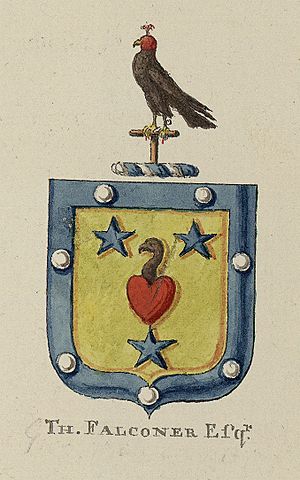Thomas Falconer (classical scholar) facts for kids
Thomas Falconer (1738–1792) was an English scholar who studied ancient history and languages. He was known for his quiet life of learning and his support for other writers and historians.
Early Life and Education
Thomas Falconer was born in 1738. His father, William Falconer, was a legal official in the city of Chester. Thomas went to Brasenose College, Oxford, a famous university, in 1754. However, he left college without finishing his degree. Later, in 1760, he became a lawyer at Lincoln's Inn in London.
A Life of Study and Support
Thomas Falconer often had poor health, so he spent most of his life studying quietly in Chester. He was very interested in old things and history, especially ancient artifacts and writings. He also loved books and supported other writers. A famous writer named Anna Seward even called him the "Mæcenas of Chester." This meant he was like a generous supporter of the arts, just like a famous Roman figure named Maecenas.
Thomas was friends with John Reinhold Forster, a well-known traveler and naturalist. Forster even dedicated one of his books, a translation of "Travels through Sicily," to Thomas Falconer. Thomas Falconer passed away on September 4, 1792. He was buried in St. Michael's Church in Chester, and a special monument was placed in St. John's Church to remember him. He never married.
His Writings and Contributions
Even though he lived a quiet life, Thomas Falconer wrote several important works:
- He published a book called "Devotions for the Sacrament of the Lord's Supper, by a Layman" in 1786. A "layman" is someone who is not a priest or minister.
- In 1791, he presented a paper to the Society of Antiquaries of London. In this paper, he defended the accuracy of Pliny the Elder's description of the famous Temple of Diana at Ephesus, an ancient wonder.
- After he died, a book he wrote called "Chronological Tables" was published in 1796. This book listed events from the time of King Solomon to the death of Alexander the Great.
- He also gathered a lot of notes and materials for a new edition of the ancient Greek geographer Strabo's works. These notes were later used by his nephew, also named Thomas Falconer, to create a new edition in 1807.
- He also wrote a poem called "Ode to Sleep," though the exact date it was published is not known.
 | Charles R. Drew |
 | Benjamin Banneker |
 | Jane C. Wright |
 | Roger Arliner Young |


